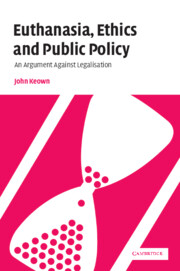Book contents
- Frontmatter
- Contents
- Preface
- Foreword
- Acknowledgments
- Table of cases
- List of abbreviations
- Introduction
- PART I Definitions
- PART II The ethical debate: human life, autonomy, legal hypocrisy, and the slippery slope
- PART III The Dutch experience: controlling VAE? condoning NVAE?
- PART IV Australia and the United States
- PART V Expert opinion
- PART VI Passive euthanasia: withholding/withdrawing treatment and tube-feeding with intent to kill
- 19 The Tony Bland case
- 20 Beyond Bland: the BMA guidance on withholding/withdrawing medical treatment
- 21 The Winterton Bill
- Conclusions
- Afterword
- Bibliography
- Index
20 - Beyond Bland: the BMA guidance on withholding/withdrawing medical treatment
Published online by Cambridge University Press: 20 July 2009
- Frontmatter
- Contents
- Preface
- Foreword
- Acknowledgments
- Table of cases
- List of abbreviations
- Introduction
- PART I Definitions
- PART II The ethical debate: human life, autonomy, legal hypocrisy, and the slippery slope
- PART III The Dutch experience: controlling VAE? condoning NVAE?
- PART IV Australia and the United States
- PART V Expert opinion
- PART VI Passive euthanasia: withholding/withdrawing treatment and tube-feeding with intent to kill
- 19 The Tony Bland case
- 20 Beyond Bland: the BMA guidance on withholding/withdrawing medical treatment
- 21 The Winterton Bill
- Conclusions
- Afterword
- Bibliography
- Index
Summary
In June 1999 the BMA published important guidance on the withholding/withdrawal of ‘medical treatment’, so defined as to include food and water delivered by tube. The guidance endorses the withholding/withdrawal of tube-delivered food and water not only from patients in pvs but also from other non-terminally ill patients such as those with severe dementia or serious stroke. The underlying justification for non-treatment appears (as in Bland) to be that such lives are not worth living and that it is right to end them by purposeful omission.
Published by the Medical Ethics Committee of the BMA, the guidance was prepared by a working group comprising nine of the Committee's twenty-five members and was written by three members of the BMA administrative staff. The Foreword states that a consultation exercise which the BMA had carried out in 1998, and which had generated over 2,000 responses, has revealed a need for guidance and that one of the most difficult issues was withholding/withdrawing tube-delivered food and water. Confusion had arisen from the fact that judicial guidance on this question related only to patients in pvs, and the BMA therefore wanted to provide guidance outlining the criteria to be applied in other conditions, such as advanced dementia or severe stroke. The guidance sought to ‘document the type of factors which should be taken into account, the process which should be followed and the safeguards which should be in place to ensure that these decisions, and decisions to withhold or withdraw other life-prolonging treatments, are made appropriately’.
- Type
- Chapter
- Information
- Euthanasia, Ethics and Public PolicyAn Argument Against Legalisation, pp. 239 - 259Publisher: Cambridge University PressPrint publication year: 2002



